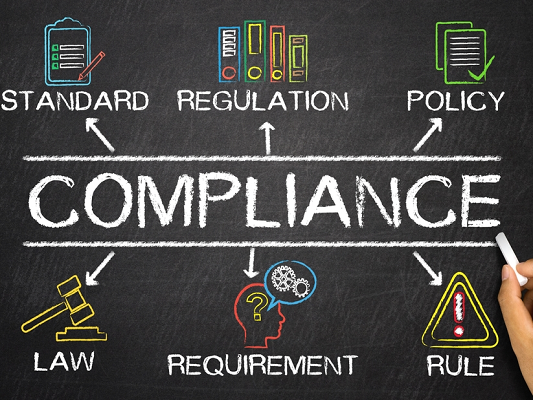 Due Diligence and Privately Owned ATMS The Financial Crimes Enforcement Network (FinCEN) recently issued a “Statement on Bank Secrecy Act Due Diligence for Independent ATM Owners or Operators” which can be found here. The Statement, “reminds banks that not all independent ATM owner or operator customers pose the same level of money laundering, terrorist financing (ML/TF), or other illicit financial activity risk, and not all independent ATM owner or operator customers are automatically higher risk.” The FinCEN Statement includes suggested (not required) customer information that may be useful for credit unions and banks to obtain in developing the risk profile for independent ATM owner or operators. This suggested information includes:
CFPB – ANPR Credit Card Late Fees The Consumer Financial Protection Bureau (CFPB) recently issued an advanced notice of proposed rulemaking (ANPR) regarding credit card late fees and late payments. This ANPR can be found here and comments are due July 22, 2022. In the press release that accompanied the ANPR, it noted that the CFPB, “is taking the first step toward addressing credit card company penalty policies costing consumers $12 billion each year, starting by looking at excessive late fees.” “Credit card late fees are big revenue generators for card issuers. We want to know how the card issuers determine these fees and whether existing rules are undermining the reforms enacted by Congress over a decade ago,” said CFPB Director Rohit Chopra. “This effort is particularly timely since current rules might give companies the incentive to impose big hikes based on inflation.” The ANPR asks 38 questions covering topics such as the factors used by card issuers to set existing levels of late fees, costs and losses, deterrence, cardholder behavior, autopay, notifications of upcoming due dates, courtesy periods and fee waivers, staggered late fee, safe harbor provisions, cost analysis provisions, and revenue and expenses. As credit unions are aware, Regulation Z, which implemented the CARD Act of 2009, § 1026.52(b)(1), a card issuer must not impose a fee for violating the terms or other requirements of a credit card account, including a late payment, unless the issuer has determined that the dollar amount of the fee represents a reasonable proportion of the total costs incurred by the issuer for that type of violation consistent with §1026.52(b)(1)(i) or complies with the safe harbor amounts consistent with § 1026.52(b)(1)(ii). Currently, §1026.52(b)(1)(ii) sets forth a safe harbor of $30 generally for a late payment, except that it sets forth a safe harbor of $41 for each subsequent late payment within the next six billing cycles. Under the category of “safe harbor provisions” the CFPB asks several questions, including:
CFPB Advisory Opinion – Debt Collector “Junk Fees” The CFPB issued an Advisory Opinion earlier this week regarding debt collection practices, pay-to-pay fees. This Advisory Opinion focuses on Section 808 of the Fair Debt Collection Practices Act (FDCPA) and applies to debt collectors as defined in section 803(6) of the FDCPA and implemented in Regulation F, 12 CFR 1006.2(i). As analyzed by the CFPB, “Relevant here is section 808, which provides that a “debt collector may not use unfair or unconscionable means to collect or attempt to collect any debt.” Section 808 then states that “[w]ithout limiting the general application of the foregoing, the following conduct is a violation of this section” and enumerates eight specifically prohibited practices, including the “collection of any amount (including any interest, fee, charge, or expense incidental to the principal obligation) unless such amount is expressly authorized by the agreement creating the debt or permitted by law.” At issue are pay-to-pay fees—sometimes called convenience fees—which refers to fees incurred by consumers to make debt collection payments through a particular channel, such as over the telephone or online. The CFPB interprets FDCPA section 808(1) to prohibit a debt collector from collecting any amount unless such amount either is expressly authorized by the agreement creating the debt (and is not prohibited by law) or is expressly permitted by law. CFPB Final Rule – Regulation V The CFPB issued a final rule, found here, to implement new section 605C of the Fair Credit Reporting Act (FCRA), added by the National Defense Authorization Act for Fiscal Year 2022 (2022 NDAA). Briefly, section 605C provides that a consumer reporting agency may not furnish a consumer report containing any adverse item of information concerning a consumer that resulted from a severe form of trafficking in persons or sex trafficking if the consumer has provided trafficking documentation to the consumer reporting agency. This rule is effective July 25, 2022, and applies to any consumer reporting agency as defined in section 603(f) of the FCRA, 15 U.S.C. 1681a(f). As explained in the preamble to the final rule, these new requirements apply to all consumer reporting agencies, including the nationwide consumer reporting agencies, nationwide specialty consumer reporting agencies, and all other consumer reporting agencies such as those focused on employment screening, tenant screening, check and bank screening, personal property insurance, medical, low-income and subprime, supplementary reports, utilities, retail, and gaming. The CFPB is not requiring consumer reporting agencies to notify a furnisher about the consumer’s submission for a block of information under the final rule given the serious privacy and data security concerns. As always, DakCU members may contact Amy Kleinschmit with any compliance related questions. Comments are closed.
|
The MemoThe Memo is DakCU's newsletter that keeps Want the Memo delivered straight to your inbox?
Archives
July 2024
Categories
All
|
|
Copyright Dakota Credit Union Association. All Rights Reserved.
2005 N Kavaney Dr - Suite 201 | Bismarck, North Dakota 58501 Phone: 800-279-6328 | [email protected] | sitemap | privacy policy |





